Is your website taking too long to load? Don’t worry! Choose the best WordPress speed optimization plugins to improve your website’s performance.
A slow site doesn’t just irritate visitors, it also kills your Google rankings.
According to Google, 53% of mobile site visitors leave a page that takes longer than 3 seconds to load.
So, if your bounce rate is high and conversions are dropping, speed could be the silent culprit.
In this blog, I’ll discuss the best WordPress speed optimization plugins, both free and paid, that actually work.
Whether you’re a beginner or an intermediate user, these plugins can give your site a serious performance boost, without requiring you to be a developer.
WordPress Speed Optimization Plugin Comparison
Let’s compare the best WordPress plugins for speed optimization based on key features and performance metrics:
| Plugin | Best For | Free Version | Cache | Image Opt. | Lazy Load | Database Opt. | CDN |
| WP Rocket | All-around use | No | ✅ | ✅ | ✅ | ✅ | ✅ |
| NitroPack | Cloud optimization | Limited | ✅ | ✅ | ✅ | ❌ | ✅ |
| FlyingPress | Core Web Vitals | No | ✅ | ✅ | ✅ | ✅ | ✅ |
First Things First: Why Are WordPress Sites Slow Sometimes?
Before jumping into plugins, let’s quickly understand why WordPress sites can lag:
- Web Hosting: Cheap, overloaded shared hosting is often a primary culprit. Think of it like building a mansion on unstable ground.
- Bloated Themes/Page Builders: Feature-rich WordPress themes can be great, but often come loaded with code and scripts that slow things down if not well-optimized.
- Too Many (or Poorly Coded) Plugins: Each active plugin adds code that needs to run. Some are lightweight; others are resource hogs.
- Unoptimized Images: Large image files are one of the biggest speed killers.
- External Scripts: Things like tracking codes (Analytics, Pixels), third-party fonts, and ads can add load time.
- Database Clutter: Over time, your WordPress database accumulates junk like post revisions, transients, and spam comments.
- No Caching: Without caching, WordPress has to rebuild pages from scratch for every single visitor. It’s incredibly inefficient.
Speed optimization plugins tackle many of these issues head-on.
Why Website Speed Optimization Matters in 2025
Website speed optimization has become a non-negotiable factor for online success in 2025, directly impacting user experience, SEO, and business outcomes.
The latest data and trends underscore its growing importance.
User Expectations and Behavior
Users in 2025 expect websites to load almost instantly.
Also, with mobile traffic accounting for nearly 60% of global website visits, speed is even more critical.
Mobile users, often on the go, are less tolerant of delays, and over 70% of websites are now indexed mobile-first.
Impact on User Experience (UX)
The first few seconds determine whether a visitor stays or leaves.
Slow sites frustrate users, resulting in lower engagement and higher abandonment.
On the other hand, fast websites encourage users to interact, explore, and complete desired actions.
Additionally, a 1-second delay in load time can lead to a 7% reduction in conversions.
For e-commerce, this could mean substantial revenue loss for every extra second of load time.
SEO and Search Engine Rankings
Page speed is a key ranking factor.
Sites that load faster and meet Core Web Vitals standards see a 24% increase in user engagement and are more likely to rank higher in search results.
Also, higher bounce rates, often caused by slow load times, signal poor user experience to search engines, negatively affecting rankings.
However, fast-loading sites allow search engine bots to index more pages efficiently, improving overall site visibility.
Business and Revenue Impact
Even small delays can have a significant impact.
A one-second delay in mobile load time can result in a 20% drop in conversion rates.
For businesses, this translates directly to lost sales and leads.
Also, users perceive slow websites as less trustworthy and outdated, while fast sites are seen as more reliable and professional, boosting customer confidence and brand reputation.
Thus, website speed optimization is essential for delivering a seamless user experience, maximizing conversions, and achieving strong SEO performance.
You can also read: 25 SEO Website Optimization Tools in 2025.
How WordPress Speed Optimization Plugins Work
Speed optimization plugins for WordPress are designed to enhance website performance.
They automate and streamline a range of technical tasks that reduce load times and improve user experience.
Here’s how they work, based on their main features and mechanisms:
- Page Caching: Creating static versions of your dynamic content.
- Browser Caching: Instructs browsers to locally store common files (like images, CSS, JavaScript).
- Minification: Removing unnecessary characters from HTML, CSS, and JavaScript.
- Concatenation: Combines multiple CSS or JavaScript files into one, reducing the number of HTTP requests required to load a page.
- Asynchronous Loading: Loads scripts asynchronously so they don’t block the rendering of the page, improving perceived speed.
- Image Optimization: Compressing and serving correctly-sized images.
- GZIP Compression: Reducing file size before sending to browsers.
- Database Optimization: Cleaning up database tables.
- Disabling Unused Features: Turns off unnecessary WordPress features (like emojis, embeds, or unused scripts) to reduce bloat.
- Script Manager: Allows selective disabling of JavaScript and CSS files on a per-page basis..
- CDN Integration: Distributes your site’s static assets across global servers, ensuring users download files from the nearest server location.
- Lazy Loading: Loading images and videos only when they enter the viewport.
- Critical CSS Generation: Loading essential styles first.
- Deferring JavaScript: Preventing render-blocking resources.
Speed optimization plugins automate complex performance enhancements, so websites load faster, use less bandwidth, and deliver a better user experience.
Now let’s explore the WordPress plugins that handle these optimizations best.
The 10 Best WordPress Speed Optimization Plugins (Free + Paid)
We’ve analyzed features, ease of use, effectiveness, community reputation, and support to bring you this list.
1. WP Rocket (Premium)

Overall Rating: 9.8/10
WP Rocket stands out as our top recommendation among the best WordPress plugins for speed optimization in 2025.
Unlike many competitors, WP Rocket starts working immediately upon activation with intelligent defaults.
Key Features:
- Instant page caching
- Cache preloading for improved performance
- Browser caching to reduce server load
- GZIP compression
- Database optimization and cleanup
- Lazy loading for images and videos
- Defer JavaScript loading
- Minification and combination of CSS/JS files
- Remove unused CSS
- Critical path CSS generation
- Google Fonts optimization
- CDN integration
- Compatibility with eCommerce sites (WooCommerce, Easy Digital Downloads)
Pros:
- User-friendly interface perfect for beginners
- No technical knowledge required for setup
- Immediate performance improvements
- Excellent compatibility with major themes and plugins
- Outstanding customer support with extensive documentation
- Regular updates with new features
Cons:
- No free version available
- Premium pricing may be prohibitive for some users
Perfect For: Bloggers, small business websites, and eCommerce stores looking for an easy-to-use yet powerful optimization solution.
2. NitroPack (Premium)
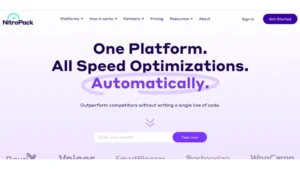
Overall Rating: 9.6/10
NitroPack takes a unique all-in-one approach to WordPress speed optimization.
It uses cloud-based technology to apply advanced optimizations beyond what typical plugins offer.
Key Features:
- Advanced caching system
- Next-gen image optimization
- Adaptive image sizing
- Resource prioritization
- Smart CDN included
- Automatic critical CSS generation
- Font rendering optimization
- Advanced HTML, CSS, and JS optimization
- Built-in analytics and performance monitoring
- Smart caching exceptions
- Cloud-based optimization engine
Pros:
- All-in-one solution requiring minimal configuration
- Cloud-based infrastructure reduces server load
- Exceptional Core Web Vitals improvements
- Detailed analytics dashboard
- Outstanding mobile optimization
- Strong compatibility with complex websites
Cons:
- Higher pricing than most competitors
- Resource-intensive on lower-tier hosting
- Limited customization for advanced users
Perfect For: High-traffic websites, membership sites, and online stores that need maximum performance with minimal technical setup.
3. FlyingPress (Premium)
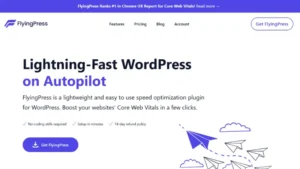
Overall Rating: 9.5/10
FlyingPress has rapidly gained popularity as one of the best WordPress plugins for speed optimization.
It focuses on Google Core Web Vitals and exceptional mobile optimization.
Key Features:
- Instant page caching
- Advanced asset loading optimization
- Critical CSS generation
- Fonts optimization and display swap
- Lazy loading with fade-in effect
- Advanced image optimization with WebP conversion
- CSS and JavaScript optimization
- Preloading resources
- Local analytics
- CDN integration
- Database optimization
Pros:
- Superior Core Web Vitals optimization
- Excellent mobile performance
- User-friendly interface with visual indicators
- Regular updates and innovative features
- Detailed documentation and setup guides
- Excellent customer support
Cons:
- Relatively newer with fewer reviews
- Some advanced features require technical knowledge
- No free version available
Perfect For: Performance-focused sites that want to excel in Core Web Vitals metrics and mobile optimization.
4. LiteSpeed Cache (Free)
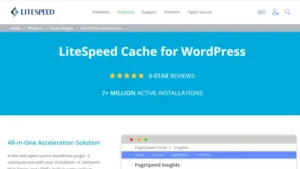
Overall Rating: 9.4/10
LiteSpeed Cache is widely regarded as the best free WordPress plugin for speed optimization, especially for sites hosted on LiteSpeed servers.
It offers an impressive set of features typically found only in premium plugins.
Key Features:
- Full-page caching
- Object cache support
- Database optimization
- Minification of HTML, CSS, and JavaScript
- CSS and JavaScript combining
- Critical CSS generation
- Lazy loading for images and iframes
- Image optimization with WebP conversion
- DNS prefetching
- Browser cache leveraging
- Heartbeat control
- CDN support
Pros:
- Completely free with no premium version
- Exceptionally powerful when used with LiteSpeed servers
- Regular updates with new features
- Excellent documentation and community support
- Comprehensive optimization features
- Image optimization included
Cons:
- Complex interface with many options
- Best performance requires the LiteSpeed server
- Configuration can be overwhelming for beginners
Perfect For: Websites hosted on LiteSpeed servers and users looking for a powerful free solution.
5. WP Fastest Cache (Premium)

Overall Rating: 9.2/10
WP Fastest Cache strikes an excellent balance between simplicity and effectiveness, making it one of the best page speed optimization plugins for WordPress beginners.
Key Features:
- Page caching
- Minification of HTML and CSS
- Combining CSS and JavaScript
- GZIP compression
- Browser caching
- Database cleanup (premium)
- Mobile-specific cache (premium)
- Image optimization (premium)
- Lazy load (premium)
- CDN integration
Pros:
- Very user-friendly interface
- Stable and reliable performance
- Good combination of free and premium features
- Low server resource usage
- Good compatibility with most themes and plugins
- Easy setup with minimal configuration
Cons:
- Most advanced features require a premium
- Premium version lags behind some competitors
- Limited customization options
Perfect For: Beginners and small websites looking for an easy-to-use caching solution.
6. W3 Total Cache (Free + Premium)
Overall Rating: 9.1/10
W3 Total Cache is one of the most comprehensive and customizable free WordPress speed optimization plugins, trusted by millions of websites, including high-traffic properties.
Key Features:
- Page, browser, and object caching
- Database caching
- Minification of HTML, CSS, and JavaScript
- Feed optimization
- CDN integration
- Fragment caching
- Import/export settings
- SSL support
- AMP support
- REST API caching
- Extensive hooks for developers
Pros:
- Extremely detailed customization options
- Enterprise-level capabilities
- Free version offers substantial features
- Regular updates and maintenance
- Strong developer documentation
- Excellent for high-traffic websites
Cons:
- Overwhelming interface for beginners
- Configuration requires technical knowledge
- Can cause conflicts in some hosting environments
Perfect For: Technical users, developers, and high-traffic websites that need granular control over caching and optimization.
7. Swift Performance
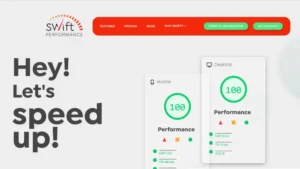
Overall Rating: 9.0/10
Swift Performance offers a balanced approach combining powerful features with an intuitive interface, making it a strong contender among the best WordPress plugins for speed optimization.
Key Features:
- Intelligent caching system
- CSS and JavaScript optimization
- Image optimization with WebP support
- Database optimizer
- Critical CSS generation
- Lazy loading
- Framework-specific optimizations
- CDN integration
- Cache preloading
- Custom caching rules
Pros:
- Good balance of power and usability
- Strong eCommerce compatibility
- Built-in image optimization
- Detailed analytics and reporting
- Regular updates with new features
- Good customer support
Cons:
- Lite version has limited features
- Can be resource-intensive
- Some features overlap with other optimization plugins
Perfect For: Medium to large websites looking for a powerful all-in-one solution with good usability.
8. SG Optimizer (Free)
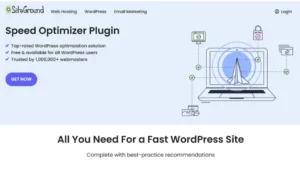
Overall Rating: 8.9/10
SG Optimizer is created by SiteGround hosting and offers deep integration with their hosting infrastructure, making it one of the best free WordPress plugins for speed optimization for SiteGround customers.
Key Features:
- Dynamic caching
- File-based Memcached
- GZIP compression
- Browser caching
- Image optimization with WebP support
- HTML, CSS, and JavaScript minification
- Combine CSS and JavaScript files
- Defer render-blocking JavaScript
- Font optimization
- Database optimization
- DNS prefetching
Pros:
- Completely free
- Optimized specifically for SiteGround hosting
- Excellent integration with SiteGround’s server-level caching
- User-friendly interface
- One-click optimization features
- Regular updates with hosting infrastructure improvements
Cons:
- Limited benefits for non-SiteGround users
- Some advanced features are missing compared to premium options
- Limited customization options
Perfect For: SiteGround hosting customers looking for an optimized speed solution.
You can also read: Schema Pro vs. AIOSEO for WordPress Schema – Which Should You Choose?
9. Autoptimize (Free)
Overall Rating: 8.8/10
Autoptimize focuses specifically on front-end optimization rather than full caching, making it an excellent complementary tool to use alongside a dedicated caching plugin.
Key Features:
- JavaScript, CSS, and HTML minification
- JavaScript and CSS aggregation
- Inline critical CSS
- Google Fonts optimization
- Image lazy loading
- Remove emojis and embeds
- Async JavaScript loading
- CDN support
- Cache information and management
Pros:
- Completely free with all features available
- Lightweight and focused on specific optimizations
- Works well with other caching plugins
- Simple interface with advanced options
- Regular updates and maintenance
- Low resource usage
Cons:
- Not a complete optimization solution by itself
- Requires a separate caching plugin for best results
- Limited support options
Perfect For: Users who already have a caching solution but need additional front-end optimizations.
10. Perfmatters (Premium)
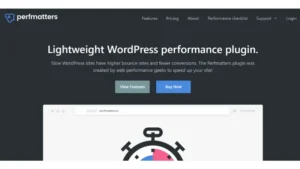
Overall Rating: 8.7/10
Perfmatters takes a unique approach by focusing on reducing HTTP requests and disabling unnecessary WordPress features rather than traditional caching.
Key Features:
- Script Manager to disable plugins on specific pages
- Remove unnecessary WordPress features
- DNS prefetching
- Lazy loading of images and videos
- Font optimization
- Remove query strings from static resources
- Preconnect
- Local analytics
- CDN integration
- WooCommerce optimization
- Database optimization
Pros:
- Lightweight with minimal server impact
- Unique Script Manager feature
- Excellent for removing WordPress bloat
- Works well alongside caching plugins
- Regular updates with new features
- Created by speed optimization experts
Cons:
- No free version available
- Not a complete solution on its own
- Some features overlap with other optimization plugins
Perfect For: Performance-focused users who want to combine it with a dedicated caching plugin for maximum results.
You can also read: WordPress Schema Plugins: Alternative Plugin to Schema Pro.
Free vs. Premium WordPress Speed Optimization Plugins
When considering the best free WordPress plugin for speed optimization versus premium options, here’s what you need to know:
Best Free Speed Optimization Plugin for WordPress:
- LiteSpeed Cache: Best all-around free option, especially on LiteSpeed servers.
- W3 Total Cache: Most customizable free option for technical users.
- SG Optimizer: Best for SiteGround customers.
- Autoptimize: Best free front-end optimization tool.
Why Consider Premium Speed Optimization Plugin:
- Setup Simplicity: Premium plugins like WP Rocket offer easier setup with smart defaults.
- Support Quality: Dedicated support teams to help with optimization issues.
- Feature Completeness: All optimization techniques in one solution.
- Regular Updates: More frequent feature and compatibility updates.
- Advanced Features: Critical CSS generation, remove unused CSS, font optimization.
- Specialized Tools: Premium plugins often include specialized tools for eCommerce, membership sites.
Beyond Plugins: 8 Best Practices for WordPress Speed Optimization
While the best WordPress plugin for speed optimization can work wonders, it’s only part of the puzzle.
For fast speed, also focus on:
- Quality Hosting: Upgrade from basic shared hosting if possible. Managed WordPress hosting, VPS, or Cloud hosting often provides better resources and server-level optimizations (like LiteSpeed!).
- Lightweight Theme: Choose a well-coded, SEO-friendly WordPress theme (like GeneratePress, Astra, Kadence). Avoid overly bloated multipurpose themes if speed is paramount.
- Content Delivery Network (CDN): Services like Cloudflare (has a great free plan), Bunny CDN, or KeyCDN distribute your site’s assets globally, reducing latency for visitors far from your server. Most speed plugins integrate easily.
- Regular Updates: Keep WordPress core, themes, and plugins updated. Updates often include performance improvements and security patches.
- Latest PHP Version: Ensure your hosting uses a recent PHP version (currently 8.0+). Each major version brings significant performance gains.
- Plugin Management: Choose lightweight alternatives for essential functions, and regularly audit and remove unnecessary WordPress plugins.
- Image Optimization: Compress all images before uploading (use WebP format), implement proper image sizing, and use lazy loading for below-the-fold images.
- External Resource Management: Minimize third-party scripts and APIs. Also, implement proper font loading strategies.
You can also read: 7 SEO Trends for 2025 Every Marketer Needs to Know.
Conclusion
A slow website is a liability.
Speed optimization isn’t just about better user experience, it’s a ranking factor and a conversion booster.
Thankfully, optimizing your WordPress site’s speed is achievable with the right tools and strategy.
Selecting the best WordPress plugin for speed optimization depends on your specific needs, technical expertise, and budget.
Moreover, combine it with best practices like good hosting, a lightweight theme, and more to have a faster website, happier visitors, and better results.
Always remember that speed optimization is an ongoing process, not a one-time fix.
Regularly test your site’s performance, make incremental improvements, and stay updated with the latest optimization techniques.
Need an SEO Professional to help you optimize your WordPress site? Contact us, we can help!
